QuestionI was given an 8 month old min pin. I would love to keep him. I had him neutered. He has been with 2 families before me. they didn't train him. we crate him at nite and immedeately take him out in the morn. he holds it all nite. but he will go out, i will see him pee and then comes in and pee and poo in the house. it is hard to see where he pees coz it doesn't leave an obvious puddle. i have read that we could tether him to us, what do you think? also please he bites when ever you pet him. not to hurt or be vicious. he is hyper and i know that this is the breed but is there any way to tone it down alittle? i have had dogs and cats all my life and done well with training. 4 years ago i was given a mini dauchsy at 6 months and she also had had 2 families before me. she finally became trained. but i could see her puddles. help please. dee
AnswerIt is never easy fixing things that weren't done right. Going out with him is right. This is material mean for younger puppies, what I am doing now with my 2 month old.
Choose a command and spot you want it to use. The less accessible to strays,
the less chance of serious disease. If it is a female, choosing a
non grassy spot will avoid brown spots later. When you bring it home, take it
to the spot and give it the command in a firm, but friendly voice. Keep
repeating the command and let the puppy sniff around. If it does anything,
praise it. Really let it know what a good dog it is and how much you love it,
and maybe a treat. Note, being out there not only means you can praise it,
but it also keeps it from being snatched by a hawk. If it doesn't go, take it
inside and give it a drink and any meals scheduled. A young puppy will need to
go out immediately afterward. Go to the spot and follow the above routine.
Praising it if it goes is extremely important. If it doesn't go, take it back
inside and put it in its crate and try again soon. Do not let it loose in the
house until it does go.
At first it is your responsibility to know and take the puppy out when it
needs to go. It needs to go out the first thing in the morning, after eating,
drinking, and sleeping. If it quits playing, and starts running around
sniffing, it is looking for a place to go. Take it out quickly. You will just
have to be what I call puppy broke until it is a little older.
By the time most dogs are about 3 months old, they have figured out that if
they go to the door and stand, you will let them out. The praise slowly shifts
to going to the door. Some people hang a bell there for the dog to paw. If
your dog doesn't figure this out, try praising it and putting it out if it
even gets near the door. A stern "Bad dog!" is all the punishment that is
effective, and only when you catch it in the act and are sure you didn't miss
it going to the door. Clean up accidents promptly. I mostly keep the little
puppies out of the carpeted rooms. Still I need the can of carpet foam
sometimes. First blot up all the urine you can with a dry towel. Keep moving
it and stepping on it until a fresh area stays dry. A couple big putty knives
work well on bowel movements. Just slide one under it while holding it with
the other. This gets it up with a minimum of pushing it down into the carpet.
This works with even relatively soft ones, vomit, dirt from over turned house
plants, or anything else from solids to thick liquids. Finish up with a good
shot of carpet foam. Note, do not let the puppy lick up the carpet foam.
Once the dog is reliably housebroken, your carpet may need a good steam cleaning.
Many people strongly strongly push cleaning up all evidence of past accidents. I am slower to suggest that. Dogs will return top the same spot if they can find it. When you see one sniffing the spot, that is your clue to run it out.
The dog needs attention. One way to ensure that to tether it to you. I have never done it. It also keeps the dog away from the nicer carpeting.
As for biting, you and everyone else have to show zero tolerance, correction time after time.
Young Labs, which I know best, and other puppies tend to very bad about
biting. You see a litter of them, and all the ones that are awake are biting
another one or themselves. I am not even sure they realize that when they are
alone, if they quit biting, they would quit being bitten. At 3 to 4 months
they are getting their adult teeth, and it seems they spend every waking
moment biting or chewing. I maintain a Lab's favorite chew toy is another
Lab. Otherwise they settle for any person they can. They keep hoping to find
one that won't yelp and jerk their hand away, or growl "Bad dog." and clamp
their mouth shut. Then offer a chew toy. They keep trying despite hundreds
of corrections. Another good technique is to quit playing and go away. Be
sure to praise them when they are playing nice and not biting.
You just have to keep on correcting them, hundreds of times, not dozens.
Provide sturdy, safe toys such as Kongs and Nylabones. Avoid things they can
chew pieces off and choke on them. Keep them away from electrical cords.
Crates are essential for most young Labs and other dogs.
My daughter has a Lhasa/Min Pin cross. He is an active little fellow, but fun. We will see how how he does with our Lab/Golden cross that is about his size over Christmas.

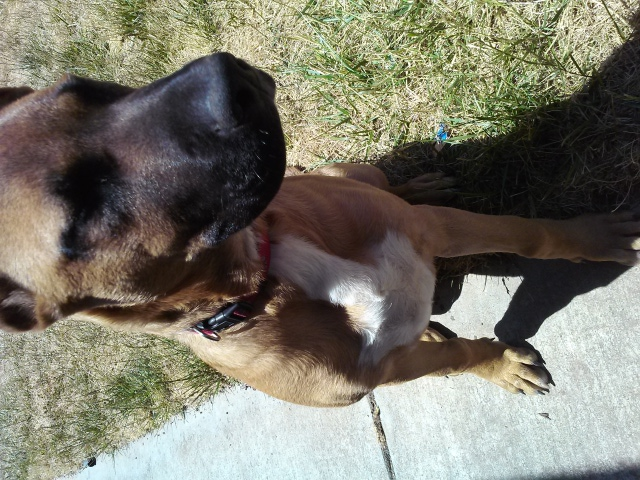 dog breed unknown
Question
dog breed unknown dog breed unknown &nbs
dog breed unknown
Question
dog breed unknown dog breed unknown &nbs
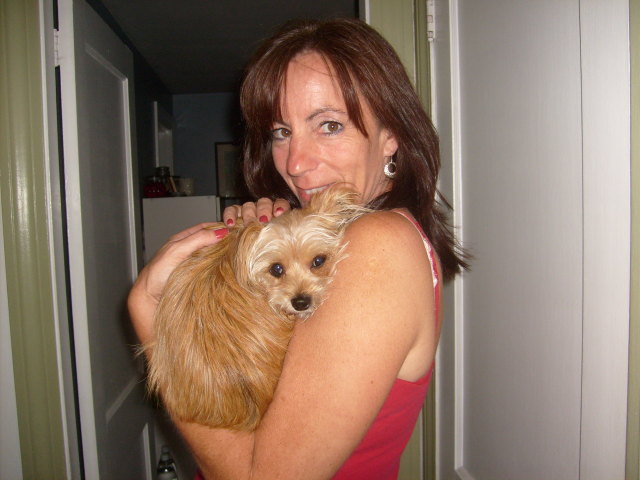 Training....
Question
Me with brady
My dog Brady is a year old, he i
Training....
Question
Me with brady
My dog Brady is a year old, he i
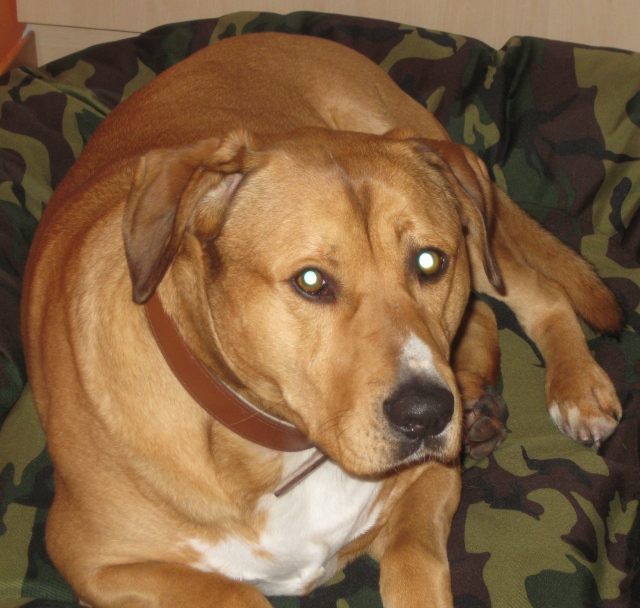 Strange dog behaviour ; organic brain syndrome in canine;
Question
Alfie
All of a sudden my 4 year old dog does n
Strange dog behaviour ; organic brain syndrome in canine;
Question
Alfie
All of a sudden my 4 year old dog does n
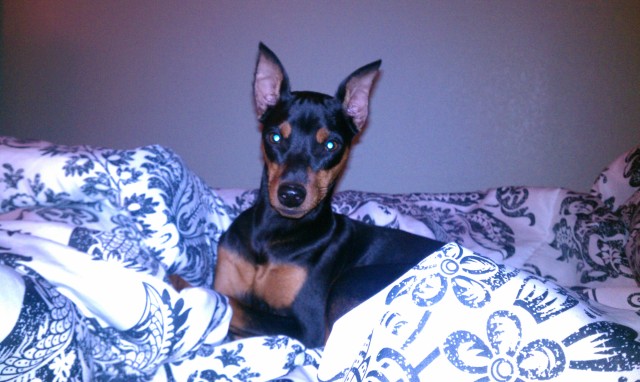 My miniature pinscher :)
Question
Chanel
I had a miniature pinscher of 8
My miniature pinscher :)
Question
Chanel
I had a miniature pinscher of 8
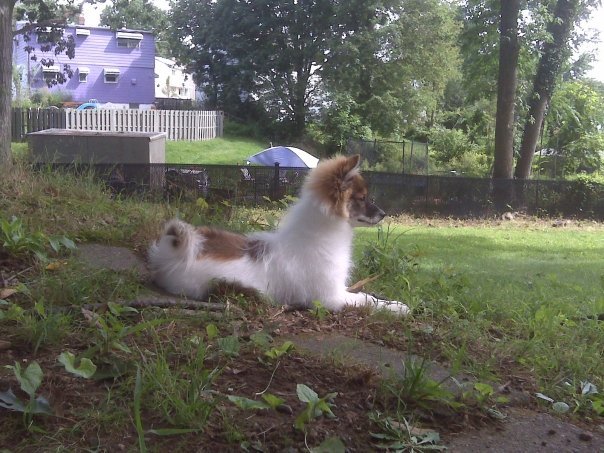 Not sure what my dog is
Question
Ella
I adopted my dog through a rescue s
Not sure what my dog is
Question
Ella
I adopted my dog through a rescue s